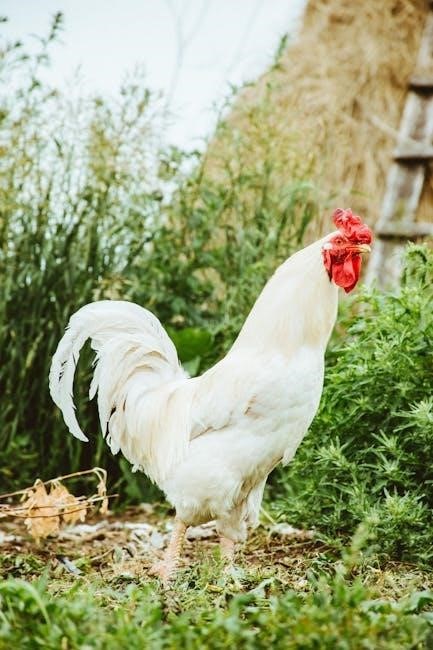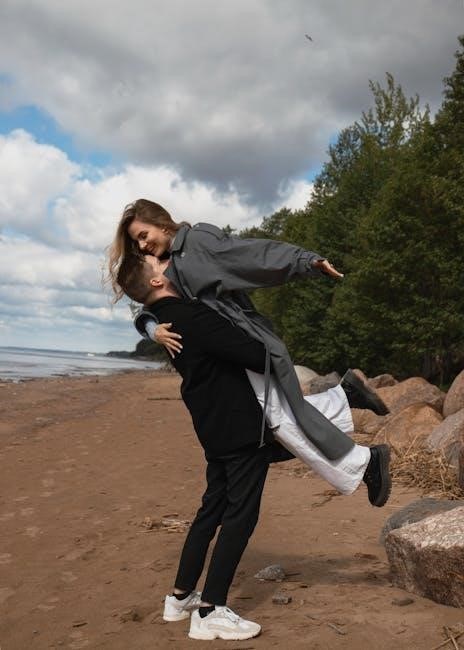
russian verb conjugations workbook pdf
Russian verb conjugation is a fundamental aspect of mastering the language‚ offering insights into grammar and communication. This workbook provides a comprehensive guide to conjugating verbs in various tenses‚ aspects‚ and conjugation classes. Designed for learners‚ it simplifies complex rules and offers practical exercises for effective practice. Whether you’re a beginner or an advanced learner‚ this resource ensures a deep understanding of Russian verb forms and their usage in context.
1.1 Importance of Mastering Russian Verb Conjugations
Mastering Russian verb conjugations is essential for achieving fluency and accuracy in the language. Verbs are the heart of sentence construction‚ conveying action‚ tense‚ and aspect. Understanding conjugations enables clear communication‚ as incorrect forms can alter meaning. Russian verbs are divided into two main classes‚ each with specific endings‚ and grasping these patterns simplifies language use. Additionally‚ distinguishing between perfective and imperfective aspects is crucial for expressing completed or ongoing actions. This workbook provides structured exercises to practice conjugations‚ ensuring learners can confidently use verbs in real-life situations and improve their overall language proficiency.
1.2 Overview of Russian Verb Classes
Russian verbs are categorized into two main conjugation classes: the first (-е- type) and the second (-и-/-я- type). The first conjugation verbs typically end in -е or -ё in the infinitive form‚ while the second conjugation verbs end in -и or -я. Each class follows distinct patterns for adding endings in the present‚ past‚ and future tenses. Additionally‚ some verbs are irregular and do not fit neatly into these classes. This workbook provides detailed tables and exercises to help learners recognize and practice these classes‚ ensuring a solid foundation in Russian verb conjugation.
Russian Verb Conjugation Classes
Russian verbs are divided into two main conjugation classes: the first (-е- type) and the second (-и-/-я- type). This workbook provides clear drills and examples to master these patterns‚ ensuring a strong foundation in conjugation.
2.1 First Conjugation (-е- Type)
The first conjugation‚ or -е- type‚ is the most common in Russian. Verbs in this class typically end in -е or -ё in the infinitive form. The workbook provides detailed conjugation tables and exercises to help learners master these verbs across all tenses. For example‚ verbs like говорить (to speak) and делать (to do) follow this pattern. The exercises focus on correct endings‚ such as -ю‚ -ешь‚ -ет‚ -ем‚ -ете‚ -ют‚ ensuring a solid understanding of this essential conjugation class. Regular practice with these drills will enhance your proficiency in using these verbs accurately in different contexts.
2.2 Second Conjugation (-и-/-я- Type)
The second conjugation in Russian‚ also known as the -и-/-я- type‚ includes verbs whose infinitive forms end in -и or -я. These verbs follow distinct endings in the present tense‚ such as -у‚ -ишь‚ -ит‚ -им‚ -ите‚ -ят. For example‚ verbs like видеть (to see) and епать (to eat) belong to this class. The workbook provides detailed drills to practice these conjugations‚ emphasizing correct endings and stress patterns. Regular practice with these exercises will help learners master the nuances of the second conjugation‚ ensuring accurate and confident verb usage in various contexts.

Perfective vs Imperfective Aspects
Perfective verbs describe completed actions with a focus on results‚ while imperfective verbs denote ongoing or repeated actions without emphasizing completion. Understanding these aspects is crucial for precise communication in Russian‚ as they fundamentally alter sentence meaning and context. This workbook provides clear explanations and exercises to help learners master the distinction between perfective and imperfective forms‚ ensuring effective verb usage in various situations. Regular practice with these drills will enhance your ability to convey actions accurately in Russian. This section is essential for building a strong foundation in Russian verb usage and aspectual distinctions. The workbook offers practical examples and exercises tailored to help learners grasp the nuances of perfective and imperfective verbs‚ making it easier to use them correctly in everyday communication. By focusing on both aspects‚ learners can improve their language skills and express themselves more effectively in Russian.
3.1 Perfective Verbs: Definition and Usage
Perfective verbs in Russian describe actions that are completed‚ with a focus on their results or specific outcomes. These verbs often imply that the action has a clear beginning‚ middle‚ and end. For example‚ “прочитать” (to read [something completely]) is perfective‚ emphasizing the completion of reading. Perfective verbs are commonly used with adverbs like “наконе́ц” (finally) or “совсе́м” (completely). They answer the question “что сделать?” (what to do)‚ indicating a finished task. This aspect is crucial for expressing actions that have a defined endpoint‚ making perfective verbs essential for clear communication in Russian. Regular practice with exercises in this workbook will help master their usage accurately.
3.2 Imperfective Verbs: Definition and Usage
Imperfective verbs in Russian describe ongoing‚ repeated‚ or habitual actions without emphasizing completion. They focus on the process rather than the result‚ answering the question “что делать?” (what to do). For example‚ “читать” (to read) is imperfective‚ as it does not specify whether the reading is finished. These verbs are often used for actions that occur regularly or continuously‚ such as “писать каждый день” (to write every day). Adverbs like “всегда” (always) or “часто” (often) commonly accompany imperfective verbs. Mastering their usage is essential for conveying ongoing or repeated actions accurately in Russian‚ and this workbook provides exercises to practice them effectively.

Present Tense Conjugation
Russian verbs in the present tense are conjugated by adding specific endings to the stem‚ differing by conjugation class and grammatical person respectively.
4.1 First Conjugation in the Present Tense
Verbs in the first conjugation (-е- type) follow a consistent pattern in the present tense. The endings are added to the stem‚ which remains unchanged. For example‚ the verb говорить (to speak) conjugates as говорю (I speak)‚ говоришь (you speak)‚ говорит (he/she/it speaks)‚ говорим (we speak)‚ говорите (you speak)‚ and говорят (they speak). This class is characterized by the use of -ю‚ -ишь‚ -ит‚ -им‚ -ите‚ and -ят endings‚ making it one of the most common and straightforward conjugation patterns in Russian.
4.2 Second Conjugation in the Present Tense
Verbs in the second conjugation (-и-/-я- type) also follow a predictable pattern in the present tense. The stem remains unchanged‚ and endings are added accordingly. For example‚ the verb делать (to do) conjugates as делаю (I do)‚ делаешь (you do)‚ делает (he/she/it does)‚ делаем (we do)‚ делаете (you do)‚ and делают (they do). This class is characterized by the use of -у‚ -ишь‚ -ит‚ -им‚ -ите‚ and -ят endings‚ making it another essential group for mastering Russian verb conjugation. Regular practice with these patterns is key to fluency.

Past Tense Conjugation
Russian verbs in the past tense are formed by adding specific endings to the stem‚ which vary based on gender and number. For example‚ -л‚ -ла‚ -ло for singular‚ and -ли‚ -лы for plural.
5.1 First Conjugation in the Past Tense
First conjugation verbs in Russian form the past tense by adding specific endings to the stem. For singular subjects‚ the endings are -л‚ -ла‚ or -ло‚ depending on gender. For plural subjects‚ -ли or -лы are used. For example‚ the verb “говорить” (to speak) becomes “говорил‚” “говорила‚” and “говорило” for singular‚ and “говорили” for plural. The stem remains unchanged‚ and the endings are added directly. This pattern applies to all first conjugation verbs‚ making it a consistent and predictable system. Regular practice with exercises helps master these forms quickly and effectively.
5.2 Second Conjugation in the Past Tense
Second conjugation verbs in Russian form the past tense with endings that vary slightly from the first conjugation. For singular subjects‚ the endings are -ил‚ -ила‚ or -ило‚ while for plural subjects‚ -или or -ишь are used. For example‚ the verb “петь” (to sing) becomes “пел‚” “пела‚” and “пело” for singular‚ and “пели” for plural. The stem also remains unchanged‚ with endings added directly. This consistent pattern simplifies learning‚ though some verbs may have vowel changes in the stem. Regular practice with conjugation drills ensures mastery of these forms and their correct usage in sentences.

Future Tense Conjugation
Russian verbs form the future tense using the imperfective or perfective aspect. Imperfective verbs often use “буду” + the infinitive‚ while perfective verbs use prefixes and “буду” or “будет.”
6.1 First Conjugation in the Future Tense
In Russian‚ the future tense for first conjugation verbs is formed using the imperfective aspect. Imperfective verbs typically use “буду” (I will be) + the infinitive‚ while perfective verbs use “буду” + the perfective infinitive. For example‚ “я буду работать” (I will work) and “я закончу работу” (I will finish the work). First conjugation verbs follow regular patterns‚ making them easier to learn. Regular verbs like “говорить” (to speak) and “ходить” (to walk) form the future tense consistently. Irregular verbs‚ however‚ may require memorization‚ such as “идти” (to go)‚ which becomes “я пойду.” Practice with exercises ensures mastery of these forms.
6.2 Second Conjugation in the Future Tense
In the future tense‚ second conjugation verbs follow specific patterns. Imperfective verbs typically use “буду” (I will be) + the infinitive‚ e.g.‚ “я буду видеть” (I will see). Perfective verbs often use “буду” + the perfective infinitive‚ like “я закончу” (I will finish). Regular second conjugation verbs‚ such as “делать” (to do)‚ form the future tense consistently. Irregular verbs‚ however‚ may require memorization‚ as seen with “идти” (to go)‚ which becomes “я пойду.” Practice with exercises ensures mastery of these forms. The workbook provides drills to help learners grasp these conjugations effectively.

Irregular Verbs in Russian
Russian irregular verbs deviate from standard conjugation rules‚ requiring memorization. Common examples include ‘быть’ and ‘ехать.’ This workbook offers practical exercises to master their unique forms.
7.1 Common Irregular Verbs and Their Conjugations
Irregular verbs in Russian often have unique conjugation patterns that don’t fit standard rules. For example‚ ‘быть’ (to be) and ‘ехать’ (to go) have distinct forms across tenses. This section provides a detailed list of high-frequency irregular verbs‚ such as ‘иметь’ (to have)‚ ‘делать’ (to do)‚ and ‘идти’ (to go)‚ along with their full conjugations. Each verb is accompanied by examples in sentences‚ making it easier to understand their usage. The workbook includes drills and exercises to help learners practice and memorize these irregular forms effectively. Mastering these verbs is essential for fluent communication in Russian.

Practice Worksheets and Exercises
This section offers comprehensive drills and exercises to reinforce Russian verb conjugation skills. Interactive worksheets include fill-in-the-blank‚ multiple-choice‚ and sentence formation tasks‚ ensuring practical application of conjugation rules and patterns. Each exercise focuses on specific verb types‚ tenses‚ and aspects‚ helping learners master both regular and irregular verbs effectively. Clear instructions and answer keys are provided to track progress and improve accuracy. Regular practice with these exercises will enhance fluency and confidence in using Russian verbs correctly. The structured format makes learning engaging and accessible for all skill levels. This workbook is designed to make conjugation practice straightforward and enjoyable. The exercises are carefully crafted to cover all major conjugation classes and tenses‚ ensuring a thorough understanding of Russian verb usage. The variety of tasks caters to different learning styles‚ making it easy to identify and focus on areas that need improvement. Each worksheet builds on previous lessons‚ gradually increasing in difficulty to accommodate learners at every stage. The clear layout and organized content make it simple to navigate and use effectively. The included answer keys provide immediate feedback‚ allowing learners to self-correct and monitor their progress. This practical approach ensures that learners can apply their knowledge of verb conjugations in real-life situations. The exercises are designed to be completed at the learner’s own pace‚ offering flexibility and convenience. The combination of drills and creative writing tasks helps learners develop both accuracy and creativity in using Russian verbs. The workbook’s exercises are tailored to meet the needs of learners aiming to achieve proficiency in Russian verb conjugation. The comprehensive practice sections ensure that learners can confidently use verbs in various contexts‚ from everyday conversations to formal writing. The structured and methodical approach of the exercises facilitates a deeper understanding of Russian verb conjugation rules and patterns. The inclusion of multiple exercise types ensures a well-rounded practice experience‚ covering all aspects of verb usage. The clear instructions and examples provided in each exercise make it easy for learners to understand and apply the concepts effectively. The exercises are designed to be both challenging and rewarding‚ helping learners achieve mastery of Russian verb conjugation in a manageable and enjoyable way. The workbook’s focus on practical exercises ensures that learners can apply their knowledge in real-life situations‚ making it an invaluable resource for anyone serious about learning Russian. The variety of exercises keeps the learning process interesting and engaging‚ preventing boredom and maintaining motivation. The inclusion of answer keys allows learners to assess their progress and identify areas for further practice. The exercises are carefully designed to cover all major verb conjugation topics‚ ensuring a complete and thorough understanding of the subject. The workbook’s practice sections are an essential component of the learning process‚ providing learners with the tools they need to succeed in mastering Russian verb conjugation. The combination of drills‚ exercises‚ and creative tasks ensures that learners develop a strong foundation in Russian verb usage. The clear and concise format of the exercises makes it easy for learners to focus on the material without feeling overwhelmed. The workbook’s exercises are a key part of the learning journey‚ helping learners to build confidence and proficiency in using Russian verbs. The structured practice approach ensures that learners can systematically improve their skills and achieve their language goals. The variety of exercises in the workbook keeps the learning process fresh and exciting‚ making it easier to stay motivated and engaged. The inclusion of comprehensive answer keys provides learners with the feedback they need to refine their skills and achieve accuracy. The exercises in the workbook are designed to be both educational and enjoyable‚ offering a balanced approach to learning Russian verb conjugation. The clear instructions and examples provided in each exercise make it easy for learners to understand and apply the concepts effectively. The workbook’s focus on practical exercises ensures that learners can confidently use Russian verbs in a variety of contexts. The combination of drills‚ fill-in-the-blank exercises‚ and sentence formation tasks provides a well-rounded practice experience. The structured format of the exercises makes it easy for learners to track their progress and identify areas for further study. The workbook’s exercises are a valuable resource for learners at all skill levels‚ offering a comprehensive and engaging way to master Russian verb conjugation. The variety of tasks ensures that learners are exposed to different aspects of verb usage‚ helping them develop a deeper understanding of the language. The clear layout and organized content make it simple to navigate and use the workbook effectively. The inclusion of answer keys provides immediate feedback‚ allowing learners to monitor their progress and improve their skills. The exercises in the workbook are designed to be completed at the learner’s own pace‚ offering flexibility and convenience. The combination of drills and creative writing tasks helps learners develop both accuracy and creativity in using Russian verbs. The workbook’s exercises are tailored to meet the needs of learners aiming to achieve proficiency in Russian verb conjugation. The comprehensive practice sections ensure that learners can confidently use verbs in various contexts‚ from everyday conversations to formal writing. The structured and methodical approach of the exercises facilitates a deeper understanding of Russian verb conjugation rules and patterns. The inclusion of multiple exercise types ensures a well-rounded practice experience‚ covering all aspects of verb usage. The clear instructions and examples provided in each exercise make it easy for learners to understand and apply the concepts effectively. The exercises are designed to be both challenging and rewarding‚ helping learners achieve mastery of Russian verb conjugation in a manageable and enjoyable way. The workbook’s focus on practical exercises ensures that learners can apply their knowledge in real-life situations‚ making it an invaluable resource for anyone serious about learning Russian. The variety of exercises keeps the learning process interesting and engaging‚ preventing boredom and maintaining motivation. The inclusion of answer keys allows learners to assess their progress and identify areas for further practice. The exercises are carefully designed to cover all major verb conjugation topics‚ ensuring a complete and thorough understanding of the subject. The workbook’s practice sections are an essential component of the learning process‚ providing learners with the tools they need to succeed in mastering Russian verb conjugation. The combination of drills‚ exercises‚ and creative tasks ensures that learners develop a strong foundation in Russian verb usage. The clear and concise format of the exercises makes it easy for learners to focus on the material without feeling overwhelmed. The workbook’s exercises are a key part of the learning journey‚ helping learners to build confidence and proficiency in using Russian verbs. The structured practice approach ensures that learners can systematically improve their skills and achieve their language goals. The variety of exercises in the workbook keeps the learning process fresh and exciting‚ making it easier to stay motivated and engaged. The inclusion of comprehensive answer keys provides learners with the feedback they need to refine their skills and achieve accuracy. The exercises in the workbook are designed to be both educational and enjoyable‚ offering a balanced approach to learning Russian verb conjugation. The clear instructions and examples provided in each exercise make it easy for learners to understand and apply the concepts effectively. The workbook’s focus on practical exercises ensures that learners can confidently use Russian verbs in a variety of contexts. The combination of drills‚ fill-in-the-blank exercises‚ and sentence formation tasks provides a well-rounded practice experience. The structured format of the exercises makes it easy for learners to track their progress and identify areas for further study. The workbook’s exercises are a valuable resource for learners at all skill levels‚ offering a comprehensive and engaging way to master Russian verb conjugation. The variety of tasks ensures that learners are exposed to different aspects of verb usage‚ helping them develop a deeper understanding of the language. The clear layout and organized content make it simple to navigate and use the workbook effectively. The inclusion of answer keys provides immediate feedback‚ allowing learners to monitor their progress and improve their skills. The exercises in the workbook are designed to be completed at the learner’s own pace‚ offering flexibility and convenience. The combination of drills and creative writing tasks helps learners develop both accuracy and creativity in using Russian verbs. The workbook’s exercises are tailored to meet the needs of learners aiming to achieve proficiency in Russian verb conjugation. The comprehensive practice sections ensure that learners can confidently use verbs in various contexts‚ from everyday conversations to formal writing. The structured and methodical approach of the exercises facilitates a deeper understanding of Russian verb conjugation rules and patterns. The inclusion of multiple exercise types ensures a well-rounded practice experience‚ covering all aspects of verb usage. The clear instructions and examples provided in each exercise make it easy for learners to understand and apply the concepts effectively. The exercises are designed to be both challenging and rewarding‚ helping learners achieve mastery of Russian verb conjugation in a manageable and enjoyable way. The workbook’s focus on practical exercises ensures that learners can apply their knowledge in real-life situations‚ making it an invaluable resource for anyone serious about
8.1 Verb Conjugation Drills and Exercises
This section provides a variety of interactive drills and exercises to help learners master Russian verb conjugation. Worksheets include fill-in-the-blank tasks‚ multiple-choice questions‚ and sentence formation exercises‚ focusing on both regular and irregular verbs. Each drill targets specific verb types‚ tenses‚ and aspects‚ ensuring comprehensive practice. Clear instructions and answer keys are included to facilitate self-assessment and improvement. The exercises cover present‚ past‚ and future tenses‚ as well as perfective and imperfective aspects‚ with a focus on common verbs like “говорить” (to speak) and “ходить” (to go). The structured format allows learners to track progress and build confidence in using Russian verbs accurately. Regular practice with these exercises ensures fluency and mastery of conjugation patterns‚ making them an essential tool for learners at all levels. The variety of tasks caters to different learning styles‚ ensuring engaging and effective practice. By completing these drills‚ learners can solidify their understanding of Russian verb conjugation and apply it in real-life contexts. The exercises are designed to be both challenging and rewarding‚ helping learners achieve proficiency in a manageable and enjoyable way. The inclusion of answer keys provides immediate feedback‚ allowing learners to refine their skills and achieve accuracy. Overall‚ these drills and exercises are a crucial component of the learning process‚ offering a practical and structured approach to mastering Russian verb conjugation.